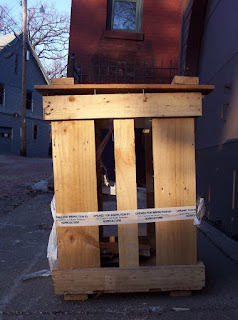
"I have known a great many troubles, but most of them never happened." Mark Twain
I've been reflecting on what I will call "catastrophe thinking." You know, the kind of story you build in your head where the absolute worst thing you think can happen does. Like you wake up with a cold and think you're going to die. Or you have a disagreement with your boss and you think you're going to be fired on the spot. Or the one we have been dealing with on a collective scale: "I'm going to get swine flu, I just know it." This kind of thinking.
I'm guessing you are familiar with this kind of thinking, maybe even have experienced this kind of thinking once, twice, a few thousand times.
There's a common saying whose exact origins I'm not aware of at this time: be prepared for the worst. People often use this to run their lives. Businesses often use this to direct their work. In fact, I would say that even entire nations use this line of thinking to direct their policies and decisions, at least some of the time. Various governmental reactions to swing flu, ranging from towns and cities in the U.S. ordering schools closed down when a single potential case of the flu is found to Egypt's order to slaughter all the pigs in the nation, are being directed by the thought that it's best to be prepared for the worst, with a lot of "better safe than sorry" added along the way.
I have to say I'm beginning to think that using "being prepared for the worst" as way of life, and a way to run a country or business, is pretty stupid.
Why? First of all, when you focus all your energy and effort on "the worst," where is there an opening for something positive to manifest? Or where is there time and space to be creative enough to shift what's happening into something beneficial, when all you're doing is fighting off every last threat?
Second, how often does "the worst" happen? Or, even more importantly, how do we even know what the worst thing would be in a given situation? Sometimes, what we think would be the worst possible outcome proves to be a positive outcome. And sometimes it proves to be minor compared to what actually happens.
I'm not suggesting that we give up having plans, give up considering various possible outcomes in any given situation, including very damaging and destructive ones. Nor an I suggesting that we pollyannishly believe that everything will always turn out good and wonderful.
But I am suggesting that excessive focus on "the worst" is a deep form of attachment many of us have, both individually, and on a collective scale. And I think it's part of the path to war, to greed-based economics, to environmental destruction, and a whole lot of suffering on the personal level as well.
To me, the catastrophe is often that you've wasted so much of your life worrying about a catastrophe that never comes. There is often more suffering incured during that time of thinking about something coming than during any actual event.
What is the impact on others of all that anxiety, panic, projecting, etc? And where does that energy go if not into the communities we live in, adding to the abundance of pain and suffering already there.
We could all do with a little less catastrophe thinking, and a lot more awareness of what is happening now. As for looking into the future, sure, there's nothing wrong with that. But can you do it without attachment to goals and outcomes? That, to me, is the real test for those who want to be prepared for anything.
3 comments:
what's the zen equivalent to Amen?
Great post.
I wonder what it would be like to prepare for the best?
Hi Jess,
The best equivalent I can think of in zen is a bow.
Nathan
Post a Comment